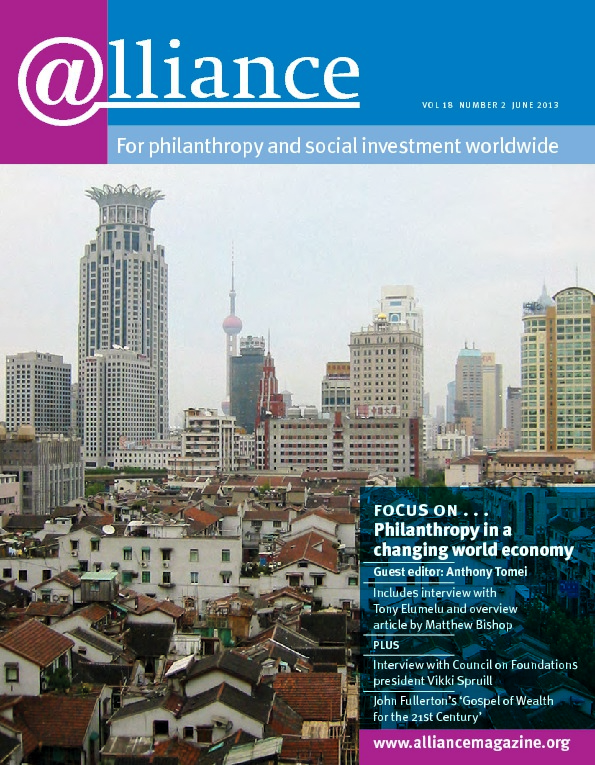The special feature in this issue of Alliance looks at ‘philanthropy in a changing world economy’. We wanted to explore how philanthropy has responded to economic changes since the collapse of Lehman Brothers in 2008. I use the word ‘explore’ intentionally: this special feature is a first stab at seeing what has been happening across the globe. We have tried to build up a picture based on the experiences and impressions of people in different countries.
One of the things to emerge most clearly is that as the balance of economic power moves inexorably east and south, new wealth is leading to new philanthropy. As Matthew Bishop recounts, the number of millionaires and billionaires globally has grown considerably since 2008 and the proportion coming from ‘outside of what we now call developed countries’ is rising steadily. Philanthropy seems set to follow suit. On 6 May it was announced that the Clinton Global Initiative is expanding to Latin America and will hold its first meeting in Rio in December. A few weeks earlier, the US-based Global Philanthropy Forum announced the launch of its latest affiliate, the African Philanthropy Forum, following the first Brazilian Philanthropy Forum last November. Here Bishop’s bet is on ‘a lot more billionaires and multi-millionaires becoming active donors and a rising share of super-rich donations as a percentage of total giving in most countries’. Alongside this, but less easy to document at this point, is philanthropy by ‘ordinary’ millionaires and by the growing middle classes.
As emerges clearly from Alison Bukhari’s account of philanthropy in India and Theo Sowa’s comments on Africa, the new philanthropy is strongly influenced by long-standing local traditions of philanthropy. Such influences are likely to be important in other places too, in Europe as much as in developing economies.
Predictably we end up with more questions than answers. Will impact investing ever live up to the hype? Will endowed foundations consider the third way between perpetuity and spend out put forward by Richard Jenkins? Will foundations find ways to address the inequality that seems to be the inevitable flip side of growing concentration of wealth?
‘Will the public become increasingly hostile to the activities of the super rich?’ Bishop wonders, ‘and will that lead the rich to use philanthropy as a way to improve their standing with the public?’ Alternatively, could there be political pressure to curb philanthropy as ‘a demonstration of growing plutocratic influence’?
For guest editor Anthony Tomei, a key question is how foundations’ relations with government will evolve. Governments everywhere will want increased input from philanthropy to help them meet the needs of their citizens, but on what terms? Will foundations have the convening power, the independence and the resources to play a part in holding government to account?





Comments (0)